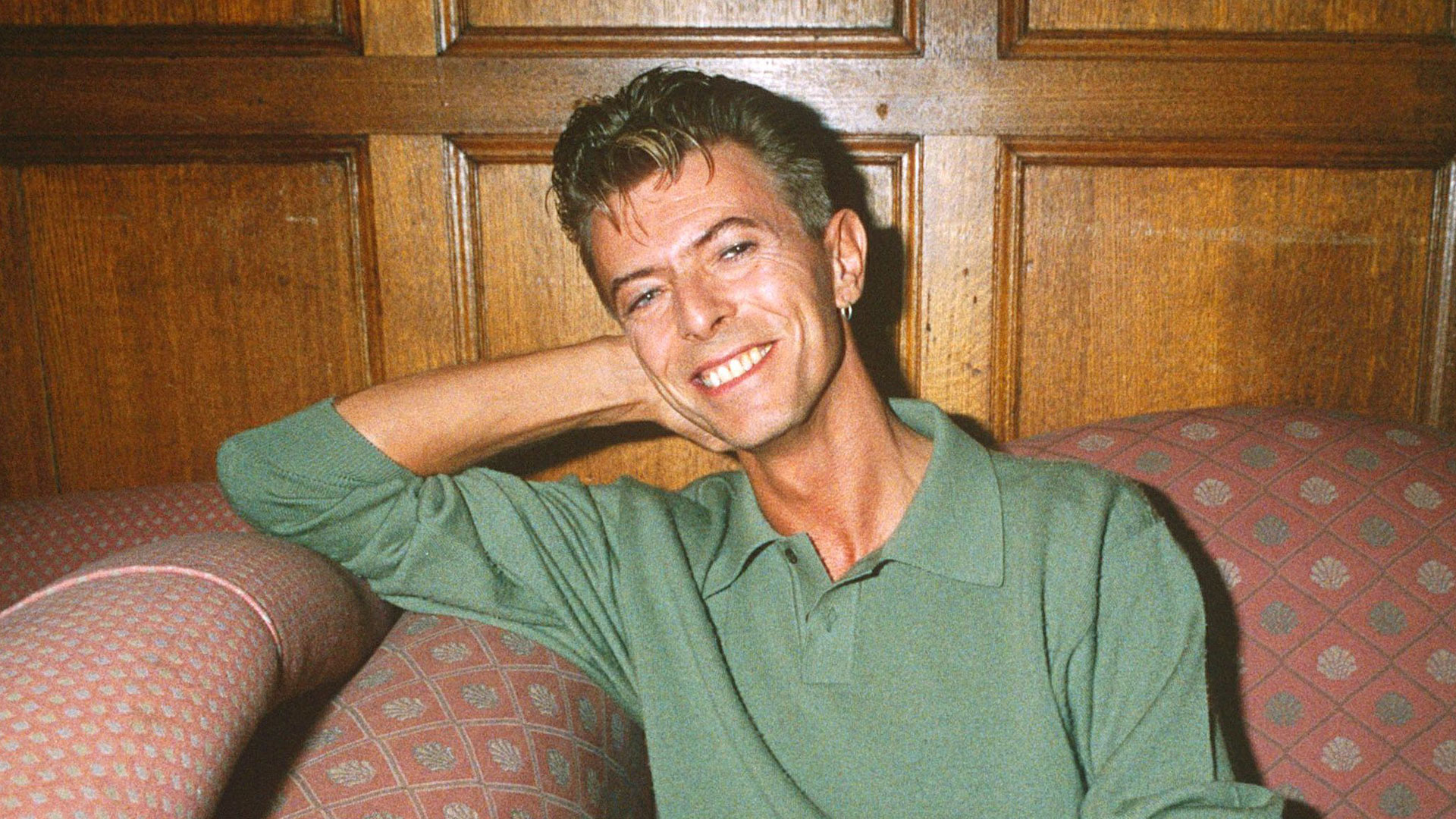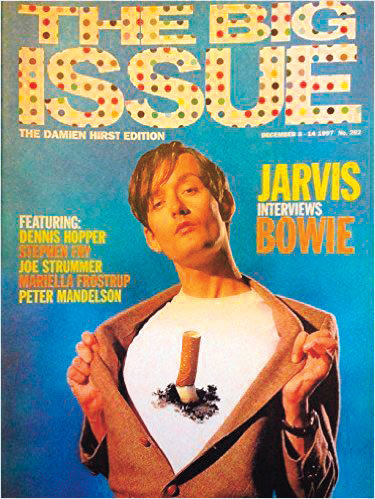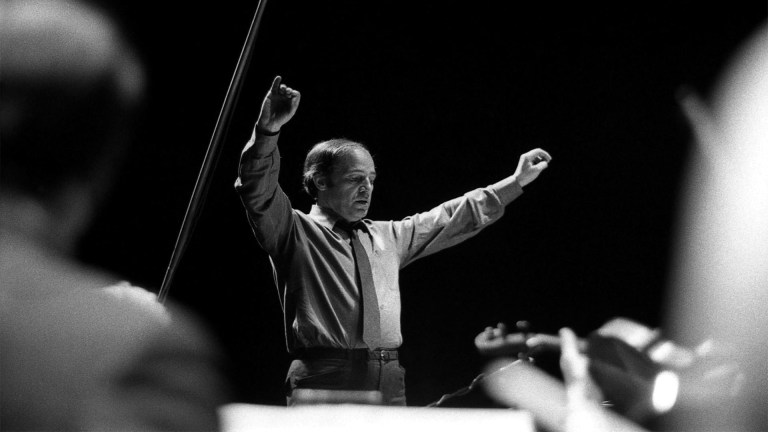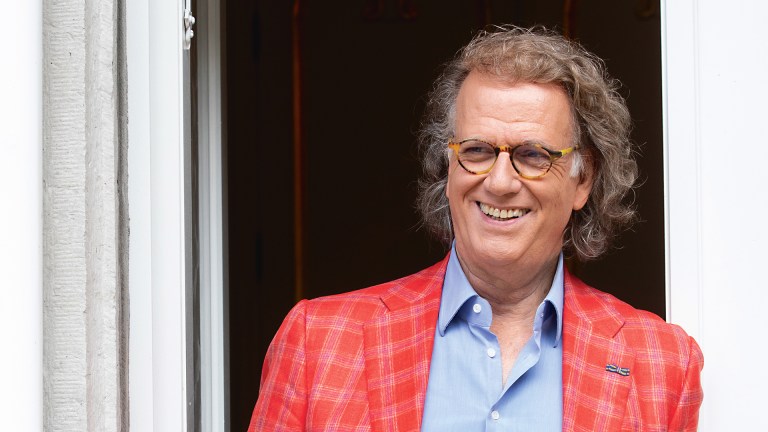DB: Yeah, I had exactly the same.
JC: And I used to say: “You know mum, you’re killing yourself.” I really was against it, so it’s quite ironic that I’ve ended up smoking.
DB: Mine was a house of smokers as well, both parents smoked a considerable number of cigarettes. I think it was Senior Service and then when my father had a better job it became Weights. And I’d steal his. I think it was the rite of passage through to adulthood that appealed to me, that was the thing about it. Are you smoking at the moment, by the way?
JC: No but I’ve got a packet just in case I feel the urge.
DB: Well, I’ve got one on so…
JC: Okay, I’ll join you then.
Advertising helps fund Big Issue’s mission to end poverty
DB: When you’re a kid it’s really a kind of perverse need to try something that’s risky because it’s frowned upon by older people. Also because you know it’s inherently bad for you.
JC: So, when you wake up in the morning, are you one of these people that reaches straight for the bedside table and lights up or do you try to stave it off for as long as possible?
DB: I’ll stave it off until breakfast. At the end of breakfast when I’m having a cup of coffee I’ll have a cigarette. So it’s from pretty early on in the morning. In a general day I get through about 40 Marlboro Lights, which is a cut-down from what I used to smoke, believe me. When I’m on the road I tend to drop down to about 20.
JC: I was going to ask you that – do they affect your voice?
DB: I think probably that I’d sing much better if I didn’t smoke. I’m sure of that actually. I’ve lost loads of notes from the top register with the years of smoking but then someone suggested that smoking will often help people presume that they could be greater if they didn’t smoke. Which I kinda like – “Well, you know if I didn’t smoke, of course I could get those top Cs.”
Our 2020 Impact Report
The Big Issue has given more than £1 million support to Big Issue vendors struggling due to the lockdown restrictions. To mark the significant milestone, we have published an impact report, documenting the seismic shift the organisation has undergone in the past 12 months.
View ReportJC: I’ll quote some lyrics to you. “Time takes a cigarette, puts it in your mouth” – am I getting this right? – “You pull on your finger and then a cigarette.”
Advertising helps fund Big Issue’s mission to end poverty
DB: That was a sort of plagiarised line from Baudelaire which was something to the effect of life is a cigarette, smoke it in a hurry or savour it.
JC: I’ve heard Damien say that every time he has a cigarette he thinks about death. Do you go along with that?
DB: I can’t think of a time that I didn’t think about death. There again, I’ve been smoking all my life so it’s hard to not equate the two together. You know, I’m fairly easygoing about the length of life in a way – it’ll sort of happen when it happens. It sounds good anyway. But will Damien still smoke around his child?
JC: Eh, I don’t know actually. I’ll have to ask.
DB: That’s an interesting thing because that’s the area that worries me. That’s the area where I get a little righteous and moral about it because, over the past at least 10 or 15 years, it’s really come home to me what impact one’s own vices can have on other people, and that really determines how I mistreat my own body. I try not to smoke around Iman that much but I’m not very good at that.
JC: Have you read Cigarettes Are Sublime? I’ve got a few quotes here: “They are sublime because they involve a confrontation with mortality.”
Advertising helps fund Big Issue’s mission to end poverty
DB: Ah, that’s the thinking-of-death-as-you-smoke number.
JC: Mmm, that’s it, isn’t it? What about this one – Oscar Wilde: “A cigarette is the perfect type of the perfect pleasure. It is exquisite and it leaves one unsatisfied, what more can one want? Each cigarette is an absolute failure, never providing the imagined fulfilment.”
It’s wise not to get too euphoric or too melancholic. A balance in-between for me has always given me a much wider and easier passage through life
DB: But I think you can apply that to nearly any of life’s pleasures. They all leave you unsatisfied because you try to reach that high every time. You always have to go back.
JC: You have to keep trying.
DB: You have to keep trying. You keep going for it. Not just to get the high but you’re hoping in desperation that one day the high that you do achieve will stay with you. But of course it never does, so in its own way it’s an avenue to insanity. It produces a rat syndrome, you know, where you just go round and round and round. Circularity.
JC: No one can ever accept the fact that life consists of a series of highlights and you can never really keep those highlights going.
Advertising helps fund Big Issue’s mission to end poverty
DB: It’s plate-spinning.
JC: That’s the thing that makes them a pleasure.
DB: It’s wise not to get too euphoric or too melancholic. A balance in-between for me has always given me a much wider and easier passage through life. I find it’s such a disillusionment to get incredibly excited and happy about things, and that will not maintain. Also it’s quite psychotic to become like that. I mean it’s really depressed schizophrenia, when you go from those incredible heights to lows. I’ve done all of those and it really serves one badly.
JC: It’s like the Prozac argument, that the drug will level people out so they will never feel things very extremely at all.
DB: Right but the other side of that is that it also reduces your ability to have emotional contact. People will not really pay quite such close attention to what their children are going through or their wives or husbands or whatever. They exist in a kind of Stepford Wife world, so there’s two sides. There’s two sides to everything, though, Jarvis. Don’t you feel that honestly in your system?
JC: Yeah.
Advertising helps fund Big Issue’s mission to end poverty
DB: Are we giving Damien what he wants?
JC: Oh God, I don’t know, and I don’t know what he wants. In America, there are loads of no-smoking buildings and no-smoking bars and you often stand shivering outside on the streets in the middle of winter.
DB: Well yes – we think of ourselves as sometimes approaching a nanny state but I think it’s far more prevalent in the States. It’s been part of their history since prohibition onwards – the idea of telling people what they should be doing. Their assumption is that they know best. Within a rational, straightforward way they’re probably right but I think you must have the choice to screw yourself. On the other hand, I do appreciate it is quite nice sometimes to have a meal without people smoking around you.
JC: It seems to be a kind of contentious point about secondary smoking or passive smoking.
DB: Yeah, and I do understand, but there again have you ever tried to conduct a relationship on cocaine? I mean, what you do to the person is absolutely foul. It really is beyond tolerance, it’s dreadful. So few drugs don’t have an effect on the other person. Coffee so far seems to be okay.
JC: You can still keep a relationship together then?
Advertising helps fund Big Issue’s mission to end poverty
DB: I think you can get a bit irritable if you’ve had too much but I think the sort of by-product of it isn’t ruined lives. I’ve not heard of many couples that were split apart by one’s addiction to coffee.
I’ve not heard of many couples that were split apart by one’s addiction to coffee
JC: It probably will happen if cigarettes get ground out of the way. So, my final question is: do you light your cigarettes with matches or a lighter?
DB: Wow. I used to light them with matches because it had a more theatrical effect, I think. But as my awareness that the cigarette doesn’t represent any particular attitude any more, it doesn’t have the potency of a symbol it used to have. I saw it once as a prop on stage, now I smoke on stage just because I need one. So now I’m quite happy with a Bic, which is pretty sort of fundamental. But I was aware of ritual and routine and theatricality with a cigarette when I was younger. I knew exactly what I was doing around the stage, and the cigarette became symbolic of a certain kind of removed identity, you know – that I don’t have to be singing these songs, I’m just doing you a favour. I think the symbolic cigarette has dropped way behind now. It’s just another bloody thing that I do.
JC: Well, you know, don’t worry about it.
DB: No, I must say I don’t. I’m not losing sleep.
JC: Right, well, that’s it.
Advertising helps fund Big Issue’s mission to end poverty
DB: Well it’s really nice to talk with you, Jarvis.
JC: You know it’s for this Big Issue thing, don’t you?
DB: Yeah.
JC: Thank you very much.
DB: Ta-ra











